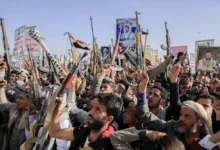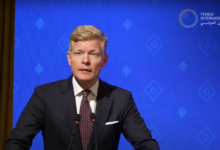Security Council Report for December 2020 Yemen Monthly Forecast

SMA NEWS – Security Council
Expected Council Action
In December, the Council is expected to hold its monthly briefing on Yemen with Special Envoy for Yemen Martin Griffiths, Under-Secretary-General for Humanitarian Affairs Mark Lowcock, and General Abhijit Guha, who heads the UN Mission to support the Hodeidah Agreement (UNMHA). The mandate of UNMHA expires on 15 July 2021.
Key Recent Developments
The Yemen war persists across multiple frontlines as UN officials issue further warnings about the risk of famine. Meanwhile, Griffiths continues, after more than eight months, to try to broker an agreement between the Yemeni government and the Houthi rebel group on a joint declaration for a nationwide ceasefire, economic and social measures, and the resumption of peace talks.
The Council held its monthly briefing on Yemen on 11 November via videoconference. Griffiths expressed disappointment in the lack of progress on the joint declaration. He said that the time had come for the parties to take the final decisions required to conclude the negotiations on the joint declaration, as the “same challenges have been coming up repeatedly, particularly with regard to the economic and humanitarian measures”. He suggested that it might be necessary to organise an in-person meeting between the parties after months of shuttle diplomacy and virtual talks, noting the recent success of the September talks in Geneva between the government and Houthis on the exchange of prisoners. “I am becoming convinced that perhaps this is exactly what is needed in the case of the Joint Declaration itself, an opportunity for the parties to explain to each other their positions and together to reach the compromises needed,” Griffiths said. “I will be discussing this and other options with the parties in the near time”.
At the 11 November briefing, Lowcock and Executive Director David Beasley of the World Food Programme (WFP) raised further alarms about the growing risk of famine. Lowcock said “the most urgent task in Yemen today is to prevent widespread famine”, and implored donors to “fulfil outstanding pledges and to increase their support” to prevent a famine, noting that more than $200 million in pledges towards the UNs humanitarian response plan, including commitments announced in September, had still not been received. According to Beasley, “Yemen will be plunged into a devastating famine within a few short months” if the international community fails to act. He, too, appealed for funding and the injection of foreign currency reserves into the Central Bank of Yemen to stabilise the value of the Yemeni rial. Beasley announced that on 8 November, the WFP had launched a pilot programme for the biometric registration of food aid recipients in Sana’a, covering 150,000 people, which he hoped would be expanded elsewhere in Houthi-controlled territory. The start of the pilot followed two-plus years of talks with the Houthis on establishing a biometric registration system to reduce the diversion of food assistance.
Omer Badokhon of Yemeni civil society initiative Solutions for Sustainable Societies also addressed Council members from Hadramout governorate. He spoke about how the war was setting back development gains and addressed its environmental consequences. On the FSO Safer oil tanker moored in the Red Sea, he said the situation was a “ticking time bomb” that threatens livelihoods in neighbouring coastal areas, and he demanded that the warring parties stop exploiting the environment for political purposes, as in the case of the oil tanker.
On 16 November, it was reported that the outgoing Trump administration in the US intends to designate the Houthis as a foreign terrorist organisation as part of further attempts to increase pressure on Iran. The prospect of such a designation has reportedly raised concerns among aid organisations and with the Special Envoy that it could have a negative impact on humanitarian operations and the political track.
The next day, Reuters reported that in high-level talks between the Houthis and Saudi Arabia, which leads a military coalition that supports the Yemeni government, Saudi Arabia said it would accept a nationwide ceasefire in exchange for setting up a buffer zone along its border with Yemen to prevent attacks against Saudi Arabia until a UN-backed transitional government is formed. On 22 November, the Houthis fired a missile that struck a Saudi Aramco oil company distribution station in Jeddah, Saudi Arabia.
Secretary-General António Guterres released a statement on 20 November warning that “Yemen is now in imminent danger of the worst famine the world has seen for decades” and called for urgent action “to stave off catastrophe”.
On 24 November, the Secretary-General’s spokesperson Stéphane Dujarric announced that the Houthis had sent an official letter indicating their approval for the UN-proposed planned expert mission to the FSO Safer tanker that will assess the tanker’s condition, undertake initial repairs and make recommendations on actions required to avert an oil spill. According to Dujarric, preparations for the team’s deployment will now begin, including to procure necessary equipment, entry permits for mission staff, agreement of a work-order system onboard and logistical planning, so the mission can arrive by late January or early February.
Human Rights-Related Developments
On 12 November, two UN experts on human rights (Marcos A. Orellana, the Human Rights Council’s (HRC) Special Rapporteur on toxics and human rights, and David R. Boyd, the Special Rapporteur on human rights and the environment) called on the Yemeni government and Houthi authorities to grant “immediate access” to FSO Safer to avoid an ecological catastrophe currently threatening Yemen and the Red Sea. A UN technical team could “conclusively avert the threat of a spill” from the tanker, noted Orellana. The likely oil spill would harm the rights to life, health and a healthy environment for some 1.6 million Yemenis, said Boyd. Calling it a “tragedy in the making”, the two experts emphasised that it must be prevented at all costs.
Key Issues and Options
The joint declaration of a nationwide ceasefire, along with a restart of peace talks, remains the main political initiative. Fighting continues on multiple frontlines—though when Griffiths briefed the Council in November, he noted a decrease in its intensity in the preceding weeks—and there has been an apparent increase in Houthi attacks against Saudi Arabia. The Houthis’ Marib offensive since the start of the year remains a significant threat to political talks, especially if fighting spreads to Marib city, which has become a political and economic stronghold for the government because of the governorate’s oil and gas reserves and the thousands of displaced persons who have relocated there during the war. Sustaining and implementing the Saudi Arabia-overseen Riyadh Agreement between the government and the Southern Transitional Council (STC) is another important issue, reflecting the complexity of resolving Yemen’s war.
The humanitarian situation, including the risk of famine, has worsened due to ongoing military operations, a shortage in donor funding compared to past years, and Yemen’s deteriorating economy. Restrictions on access for humanitarian actors, particularly those imposed by the Houthis in the north, and the COVID-19 pandemic contribute to the worsening situation.
The FSO Safer oil tanker is an equally vital issue, including that the Houthis’ fulfill their most recent commitments to the UN for allowing access for the technical mission. An oil spill from the deteriorating ship would prevent use of Hodeidah’s critical port for up to six months and have grave environmental, humanitarian and economic consequences for Yemen and the region.
If agreement is reached between the government and the Houthis on Griffiths’ proposed joint declaration, the Council may adopt a resolution to welcome or endorse the deal.
Another option is to have the Group of Eminent International and Regional Experts on Yemen, established by the HRC in 2017, brief the Council on its annual report on the human rights situation in Yemen. (This year’s report again documents violations of human rights and international humanitarian law by the warring parties in Yemen and recommends that the Security Council refer the situation to the International Criminal Court.)
Council Dynamics
Council members appear aligned in their support of the Special Envoy, continuing to back his efforts to reach an agreement on the joint declaration of a ceasefire and the resumption of a political process. Members further share concerns about the humanitarian situation and the FSO Safer. So far this year, members have issued multiple press statements and press elements urging the parties to reach agreement on the declaration and calling on the Houthis to facilitate the UN technical mission’s access to the oil tanker. The US, which has sought to reimpose sanctions on Iran, often points to what it perceives as Iran’s destabilising role in Yemen.
The UK is the penholder on Yemen. Ambassador I. Rhonda King (Saint Vincent and the Grenadines) chairs the 2140 Yemen Sanctions Committee.








